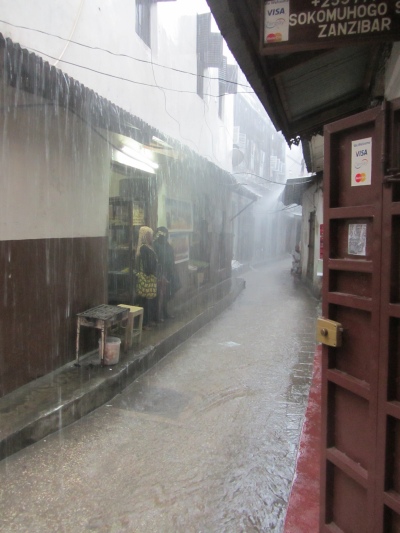 Alleys Turned into Streams |
The haunting call to prayers summoned the faithful well before sunrise, and a murder of Indian crows kicked off into squawk mode as the skies started to take on those first silvery hints at dawn. There was no point in trying to get a few more minutes of precious sleep, so I arose, enjoyed a long cool shower, and went up to the roof for breakfast. I found it a pleasant relief this morning, no more merciless, baking sun, just a heavily overcast sky with a rolling mass of dark, foreboding shades of grey foretelling rain and perhaps storms. Distant thunder rumbled, and a breeze picked up, refreshingly cool.
Dan was keen to pick up a curio he had spotted a day ago, and I knew where to find the shop in the labyrinth of narrow alleyways, so we set forth into the dark interior, never to be seen again.
Sally, meanwhile, went off to find an internet cafe so that she could find a cheap set of flights back to Kisumu. Kenya's elections hadn't been the bloodbath expected, so she wanted to get back to prepare for some appointments.
Dan made his purchase after some haggling with the curio shop manager. Their debate must have irritated the Gods since the heavens opened, accompanied by thunder and lightning. Standing in the shop doorway, I gazed mesmerised by the sight before me. Water was cascading off the roofs into the alleyway, and where gutters had rusted away into gaping holes, waterfalls tumbled down, hitting the corrugated iron awnings above shop entrances, and splattering small showers off in all directions. The alley was a river centimetres deep. Despite this, some individuals were still determined to carry on walking along the alley, utterly drenched of course. Motorbikes would scoot down the flowing deluge, spraying water and filth aside as they melted into the seething mist.
I fell into conversation in the shop doorway with a young chap. He seemed to be in his early thirties, wore a traditional Dishdasha robe and a Kummah cap, and was connected to the shop in some way. "Where are you from?" he asked as he gazed up at the lacework of water pouring down the side of a building. "Ipswich, England," I replied. "Ipswich, I don't know it, where is it near?" he enquired. "Colchester," was my off the cuff response. That rang a bell with him. "I am amazed that with this entire spider's web of electric cables outside in the heavy rain, nobody gets electrocuted," I remarked, nodding towards a bird's nest of wires and cables running off in all directions. He laughed, "We trust to luck. In Arabia, they bury all their 400KV cables under the sand, and when it rains, many people get electrocuted." Hmmm.... I thought, health and safety seems to be on a different plain out here.
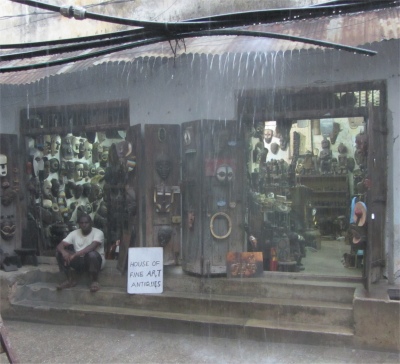 Cascading Rains |
On enquiring about a coffee shop, the young fellow and shop manager directed us around a corner; the "best strong coffee," we were advised. Dodging the plump rain drops, we sprinted around the corner into a small square, a sort of community courtyard, located at a confluence of four of Stone Town's winding, old alleys, known as Jaws Corner. The square was surrounded by dilapidated buildings, complete with rusty roofs, and rotting shutters hanging ajar on the last hinge. All around the saquare were baraza benches, thick benches of sold stone built into the walls. A wizened, elderly gentleman sat on some steps with an impromptu coffee stall. The coffee was brewed in two steel kettles, balanced precariously over a small charcoal stove. On a small table in front of the old man, lay a tray of small handle-less porcelain cups, so common in the Muslim world. Alongside it stood two cans of clear water, patiently collecting rainwater, in which the cups were cleaned.
We asked the old man for two coffees, an on-going process for him as an endless stream of pedestrians, bicycles and motorbikes moved back and forth into the courtyard, with folk stopping off for a quick cup, and then onwards. Around the edge of the square, on steps sheltered from the sun and the rain, local men of African and Arab descent, old and young, sat and debated. A blackboard on one of the stone walls was used to disseminate local news, such as the death of one of the community, or a birth. This was one of those vital places where men gathered in the early morning to socialise, strengthen their community, and bond together.
We sat on a baraza under a rusty awning, glad that the rain had almost stopped. The coffee we slowly sipped was the blackest I'd ever drunk, and of super espresso strength. It possessed none of the granularity that one would normally find in Turkish coffee, it was just black, unsweetened and served in the small cups that burned your fingers. Instead of adding sugar, locals would alternate between a sip of coffee and a nibble of a sugary treat such as sweet peanut brittle, sold by a little girl holding a bag full of the stuff.
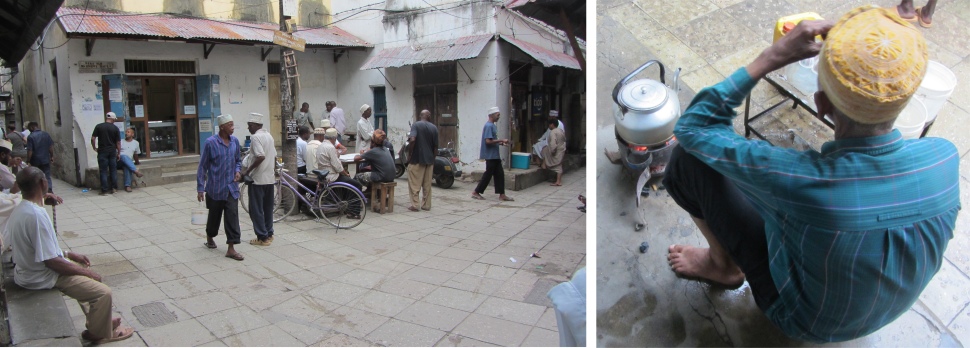 Jaws Corner and the Coffee Man |
We partook in two more coffees and enjoyed people watching while the peeping sun dried out the alleys. Oh, the price for four coffees, 400 Tanzanian shillings, about 4p per cup. Eat your heart out Starbucks.
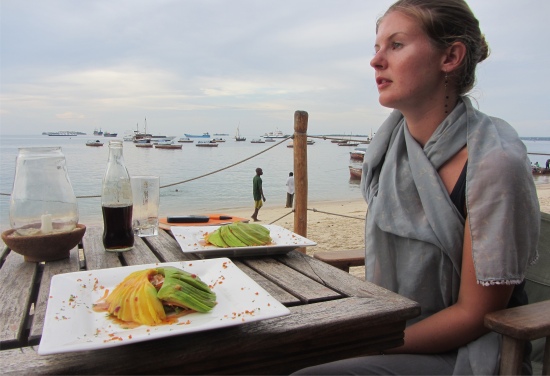 A Spot of Lunch - Mango and Avocado Salad |
The main office was far away on the northern exit from the town, so Dan and I took a cab to these headquarters, while Sally stood guard at the ATM in case my card appeared by magic. The main office didn't seem to show any surprise at my demise, and simply requested that I return at 10:30 the following day with my passport. To doubly protect myself, I called my bank in the U.K. to put a block on my card until further notice. We were to learn that the main office was the only place where we could withdraw cash on the day, all other ATMs were defunct.
All too soon time was now running out for Dan, and our goal was to help him get his kit to the ferry terminal and see him off. It was sad to see him go, he had been good company and would be sorely missed. The lad had really enjoyed his adventure. Now he was faced with a crossing to Dar es Salaam, and then a long haul back to the U.K. via Dubai. Believe it or the journey from Heathrow to Colchester, where he lived, would be complicated. He had already learned that weekend rail works would entail a mixture of busses and trains between London and Colchester, so he was going to get a train to Stansted and then a coach across to Colchester.
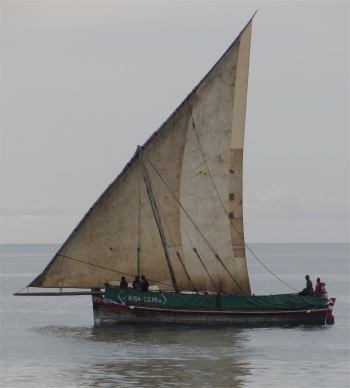 Stone Town Dhow |
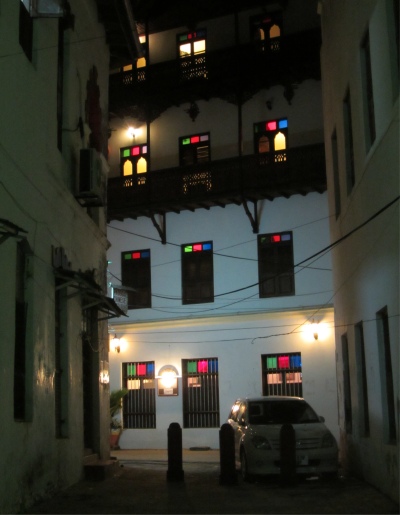 Pretty Night Lights |
After a brief detour into the Old Fort to allow Sally to investigate the arts and crafts stalls, we entered the bazaar where Sally scoured the curio and craft shops for presents and souvenirs. We took time out at Jaws Corner for a coffee in mid-afternoon, and the small square had taken on a different character. A group of young men sat in a huddle in the centre, noisily yattering as they played a board game involving much loud banging of tiles onto a board.
Myriads of primary school children were entering the square down one of the narrow alleyways, all still neatly dressed after their day at school, with rucksacks bursting with books, and all chattering, laughing and gleefully singing as they dispersed into the surrounding alleys. A chap walked by in a white robe, and we recognised each other instantly. He was the mechanical engineer I had chatted to earlier in the day. He stopped for a chat before dashing off on his business. Then an old man cycled up and parked his bike in order to get his coffee fix for the day. "Jambo!" he shouted across to us, and then started to natter away to us rather quickly in Swahili. I was lost, but Sally managed to communicate with him. I gathered later that he had pointed out to her that she was not speaking "grammatically correct" Swahili. She responded by telling him that Kenyans tend not to. He appreciated this fact and laughed all the way to the coffee pot.
Sally resumed her shopping, and I observed in one curio shop, the owner's children patiently sitting on chairs in a corner doing their homework. Near them lay their school text books - all in English. A few more souvenirs later and Sally was done shopping. We returned to base for cold showers, then shared a delicious Chinese meal in the evening before ending our evening with a cocktail in Livingstone's. Listening to the music drifting out of the building, we played the last games of our on-going Rummy match, and the ceaseless sea caressed the shore washing all our worries away. A lovely way to end an eventful day.
